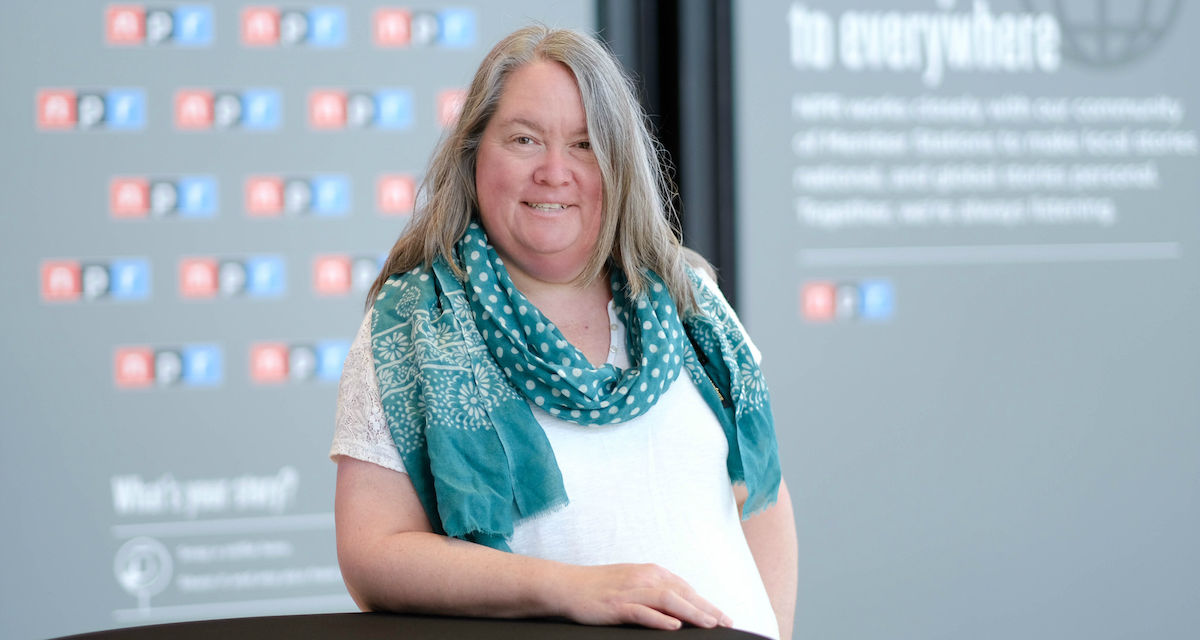Even Stories Need Tech Support: Christine Geiger ’90
On KYUK Public Radio, a volunteer-run NPR member station broadcast from inside Alaska’s Yukon Kuskokwim Delta, someone from anywhere in the world can livestream the Yup’ik Word of the Week or follow Iditarod mushers and their sled dogs through 1,000 miles of Alaska’s harshest terrain. This is possible, in part, because KYUK has someone like Christine Geiger ’90 to keep their website running and give them ideas and strategies for how to use it.
But, Geiger says, she didn’t land the station support manager job at NPR headquarters in Washington, D.C., because she was a “tech genius.” She got the gig because she has a special talent for translating technical information into something the average person can understand. In other words, she had the soft skills—and the hard skills came later.
Now Geiger provides technical support for the vast majority of NPR’s 1,000 member stations. That includes the big ones like WBEZ in Chicago (home of This American Life) and also smaller stations like KYUK.
“I love working with little stations because in these more remote areas terrestrial radio is definitely not dead,” says Geiger. “There are a lot of places in the country where there aren’t cell signals, and radio is the only way to stay in contact.”
In Geiger’s mind, these hyperlocal member stations are doing big work—like keeping Native American languages alive, making healthcare accessible and even enabling the public to find missing people.
“When there’s an emergency—if a hiker goes missing while they’re hiking out on a glacier or a fishing boat goes missing off the coast,” explains Geiger, “KYUK is where people gather information in order to go help them.”
But when emergency strikes at one of NPR’s member stations by way of a “website malfunction,” say in the middle of a local election or someone simply forgets their website password, Geiger is the one to help.
Because in the digital age, even stories need tech support. And without people like Geiger, radio stories would have a much shorter lifespan and reach.
Geiger explains, “You have these web stories that are built off the backbone of the radio story. They become a little bit more timeless. They’re not just heard once on the air and they’re gone into the ether.”
To save radio stories from disappearing after they’re aired live, Geiger manages NPR’s content management system, which makes it possible for any member station to archive their broadcasts online (so listeners can find the title of the song they just listened to or replay a broadcasted story).
With this technology and the people needed to support it (aka Station Support), audio stories, like written stories, have an eternal, even omnipresent quality to them. They can be played at any time from any place with an internet connection.
In a way, Geiger and her team have a unique connection to both NPR’s storytellers (the member stations) and their listeners. They are involved in the entire plotline, from before a story goes online to after it interacts with someone, working out the kinks along the way. Their service to member stations and listeners alike allows for something bigger to take place—for someone to feel heard, for a missing hiker to be found in the Alaskan wilderness or for the Yupik people to run a radio program that helps keep their native language alive.
And, every month, 41.6 million people interact with some form of media on an NPR website. They might watch a Tiny Desk Concert, catch up on a local election, read about newly authorized delivery robots in Washington State, or listen to thoughtful kids pose questions like “Do skunks like their own smell?” on Vermont Public Radio’s But Why?
But the point is, NPR couldn’t do any of this without their behind-the-scenes heroes, on the other end of the phone or email chain, ready to make sure that all NPR stories, big and small, don’t get lost into the ether—or to a classic 404 error page.
 The Bell
The Bell